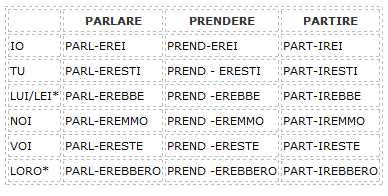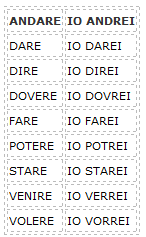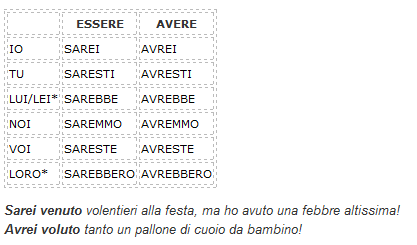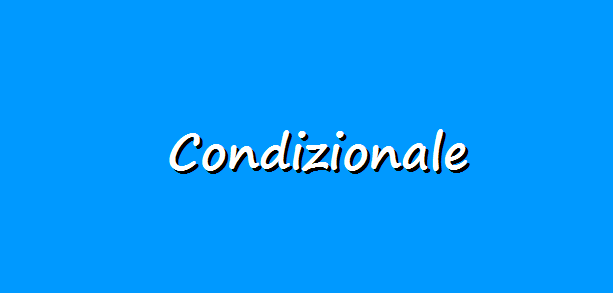What is the conditional for?
The conditional is a verbal mode used to express actions or situations that are conditioned by other actions.
![]()
(If the weather were good, I would go to the sea)
The condition is that the weather must be good. If that condition is true, then I will perform the action expressed by the verb in the conditional form: I would go.
The conditional mode is used very often in the Italian language, with other meanings. As we will see, this verbal mode is also used in autonomous sentences, without any condition to be realized…read on!
How is the conditional formed?
The conditional only has two tenses:
- the present (or simple) conditional
- the past conditional (which is formed by taking the simple conditional of the auxiliary verbs to have or to be + the past participle of the verb that you want to use)
Look at the following table to understand how to form the simple conditional:

*You may use the pronouns Egli/Ella (singular) and Essi (plural) instead
As you may have noticed, the simple conditional of the verbs ending in -are is the same as that of the verbs ending in -ere.
In the following table you can read the conditional form of some important irregular verbs (knowing the first person singular you can continue in the same way for the other persons by following the examples in the first table):

Here instead you can read the simple conditional of the auxiliary verbs to have and to be. As we have already mentioned, they are used to form the past conditional:

(simple conditional of the auxiliary verb + past participle of the verb which carries the meaning)
When to use the conditional
The conditional mode is mainly used to express:
- a desire
- an advice - in this case it is often preceded by an expression such as “se fossi in te” (if I were you)
- a gentle request
- an uncertain information

Less often, the conditional is also used to:
- express a doubt (especially with the modal verbs want, can, must)
- express something in a more delicate way
![]()
Let’s now consider a very precise use of the past conditional: this tense is often used in Italian when we want to talk about an action or a situation which has happened in the past after another action. It is known as “the future in the past”. When the past conditional is used in this way, you will often find adverbs of time indicating the future (dopo, successivamente etc).
![]()
(We knew that things would go that way - The act of “knowing” happens before the fact that “things go that way”)
We hope you now have a clear idea about how the conditional is used. Follow the links below to find more texts, exercises and songs using the conditional form.
Exercises
A song
A dialogue
